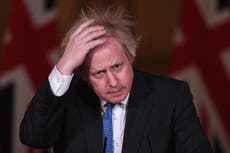Don’t make poorer countries wait for vaccines, WTO chief tells Boris Johnson
PM has pledged to donate ‘surplus’ – but failed to say how many jabs will be made available or when
Boris Johnson has been criticised by the new head of the World Trade Organisation for refusing to share vaccines with poorer countries until the UK has a surplus.
Ministers have failed to say how many jabs will be made available or when – despite ordering 450 million doses, meaning vast numbers will be left over.
“I don’t think we should wait to get surplus when other people have been served,” said Ngozi Okonjo-Iweala, the WTO director general.
“I think that any donations that are coming must come now. The reason is very simple – it’s in the interest of rich countries as well as poor countries to have equitable access.”
Just 10 rich countries have administered 75 per cent of all vaccinations worldwide, while 130 countries had not yet received a single dose, the United Nations said.
Ms Okonjo-Iweala, both the first woman and African to lead the trade body, pointed to research suggesting a £6.4 trillion GDP slump if – by the middle of this year – that gulf remains.
She described Mr Johnson’s pledge to donate most of the UK’s excess vaccines to developing countries when there is a surplus as “welcome”.
But, she told the BBC: “Half of that cost will be borne by rich countries.
“So we need to understand that it’s in the self-interest of both rich and poor to have equitable access to vaccines otherwise all counties lose; all people lose.”
Emmanuel Macron, the French president, has said richer countries should start sending around 5 per cent of their current vaccine supplies to poorer nations.
And Russia, China and India are making their supplies available – in what is seen by some as “vaccine diplomacy”, a route to building closer ties with other capitals.
On Friday, G7 leaders agreed to increase their contribution to the Covax initiative, which is aiming to get at least 1.3 billion doses to vulnerable people across the world in the coming months.
Ms Okonjo-Iweala urged manufacturers to issue more licenses in developing countries, so a larger volume of doses could be produced across poorer regions.
Mr Johnson told the G7 there was “no point in us vaccinating our individual populations - we’ve got to make sure the whole world is vaccinated because this is a global pandemic”.
However, the UK is determined to first vaccinate its entire adult population, by the autumn at the latest, and ministers expect fresh jabs to be required to combat new variants of the virus.
Join our commenting forum
Join thought-provoking conversations, follow other Independent readers and see their replies
Comments




Bookmark popover
Removed from bookmarks